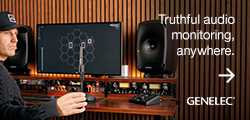![]() A working lifetime in the making, weeks in preparation, and the presentations lined up for the 2016 Future of Broadcasting conference were thrown a curveball just days ahead of delivery. With the result of the EU Referendum announced on Friday, the conference convened on the following Monday to make its predictions.
A working lifetime in the making, weeks in preparation, and the presentations lined up for the 2016 Future of Broadcasting conference were thrown a curveball just days ahead of delivery. With the result of the EU Referendum announced on Friday, the conference convened on the following Monday to make its predictions.
With many speakers erring on the side of caution, one stood out – Claire Enders’ warning over future BBC funding…
With a White Paper designed to ‘provide the BBC with long-term stability and a strong foundation for the BBC to continue to inform, educate and entertain the entire British public’ recently agreed, Enders (the name and leading light behind media and telecommunications analysts Enders Analysis) warned that the Brexit decision is likely to see funding re-examined.

She described the BBC White Paper as being a more positive outcome than many had expected, making PSB (public sector broadcasting) safe for another 11 years and keeping the licence fee intact.
But while this was ‘extraordinarily helpful’ to commercial broadcasters, the referendum outcome had wiped 26 per cent from ITV shares and left newspaper shares down by ten per cent.
‘In the past 30 years, EU regulation has done the broadcasting sector no harm whatsoever,’ she said, quoting a UK-EU two-way trade of £450bn in goods and services. ‘There isn’t anything good you can say about Brexit for the broadcast sector.’ She was not entirely sure that we were going to see a ‘full Brexit’, however.
Acknowledging the referendum outcome as significant, the event’s other speakers remained close to their original brief. That left plenty of ground to cover.
While focused on the UK, the bigger broadcasting picture being discussed is obviously international, shaped by technological advance and social response. To discuss it were representatives from across the industry, including the BBC, Channel 4, Sky Media, Arquiva, YouView, Akamai, ITV, Amazon Prime, the Broadcasters’ Audience Research Board (BARB), MediaCom UK, BuzzFeed, Discovery Networks, Ofcom, Viacom International Media Networks, Twitter, Applicaster, UKTV, Freesat and Freeview.
With a number of speakers arguing that live linear TV is weathering the assault of VOD and OTT delivery beyond expectations, Sky-Q’s Luke Bradley-Jones promoted the acceptance of a ‘truly connected world’, with viewers now expecting to watch TV whenever and wherever they wish.
He noted an increase in video viewing up 20 per cent on 2010, and reckons Sky to have overtaken BBC’s iPlayer as the most used on-demand platform. ‘Apart from major live events, people care less and less whether their TV is live,’ he asserted.

Sky’s response to this is its Sky Q service, a premium packaging of technology and content that covers household-wide viewing in all formats and comprehensive internet access through apps. Billed as ‘Our most advanced TV experience ever’, Sky Q will quickly offer Ultra HD resolution, split-screen viewing, voice searching and other advances.
Illustrating the changing expectations of viewing in his own presentation, ITV Director of Marketing & Experience for Online & On Demand, Steve Forde, anticipates a ‘tremendous step change’ in the monetarisation of the Rio Olympic Games over the 2012 London Olympics.
Recalling that the first 4k broadcast was YouView’s delivery of Sky Sports, YouView CEO Richard Halton described it as a ‘defining moment’ that proved the continued ability of linear broadcasters to innovate. Recently this was demonstrated by the developments of the BBC’s Red Button service bringing ‘new levels of coverage’ to the Glastonbury music festival. This facility is to be rolled out more widely for forthcoming coverage of the Rio Olympics.
‘The online audience is growing,’ Akamai’s Ian Munford had already confirmed. ‘It is not an “us-and-them” relationship between OTT and live linear viewing. ‘We see a massive increase in online activity every time there is a large sporting event.
‘Online quality is racing ahead of linear technology,’ he also claimed. ‘Higher quality earns very good response from consumers, so we are looking to improve – 4k is now the benchmark. This will see the requirements of internet technology rise dramatically. The bottleneck is in the core of the internet – it is presently able to support just 14 per cent of 2020 expected bandwidth.
‘Live viewing remains at the heart of UK viewing,’ Bradley-Jones insisted. This belief was reflected in the recent relaunch of the ITV Player app in 2015: ‘It was missing a sense of live TV viewing, so we have made more of our channel brands in the new ITV Hub’ he explained. Offering access to all seven ITV channels live, he was able to report a 41 per cent increase in traffic after eight months’ operation.
‘In many ways, television is working better now than it ever has,’ said MediaCom UK CEO, Josh Krichefski. He quoted the use of an advertising slot to broadcast Sam Smith performing his new single live from London’s Roundhouse – and gaining better viewing figures than the show it was broadcast during. ‘The clip was then posted on YouTube and the song promptly took the No.1 chart position in spite of the singer’s relative obscurity at the time.’
Stats entertainment
The conference also devoted time to audience research. There was serious discussion of Project Dovetail – which will build a more accurate model by adding BARB panel data to device-based data. ‘To survey smaller things, you need bigger samples,’ explained BARB Chief Executive Justin Sampson. ‘Advertisers need to know how people feel about what they see – robots don’t buy deodorant.

‘Online viewing is still very much in its infancy,’ he said, adding to Krichefski’s warning that not all second screen viewing is feeding what is being watched on the main screen.
With data from set-top boxes’ return path and metadata derived from viewing apps, BARB is expecting to build a more accurate picture of who is watching television, and how and when they are watching it, than has previously been possible. This is anticipated to greatly assist every stage of programme making and delivery, enabling broadcasters and supporting industries to tune their efforts and technology to provide more sophisticated and flexible services than have previously been imagined.
‘The entire industry is going through structured change in viewing habits that is critical to our revenue,’ said UKTV’s Chief Commercial Officer, Simon Michaelides. ‘[Our research shows that] linear viewing is declining at an increasingly early age, and those viewers are no longer coming back. VOD unlocks a wealth of new facilities and has put customer relationships at the front. Granular understanding of audiences and viewing allow targeted advertising – this is the new norm for the industry as a whole.
‘We are undertaking a complete refresh across all platforms to encourage greater depth and breadth of viewing.’
As an example of fresh thinking Michaelides quoted Spotify’s ability to give users their ‘year in music’: ‘An aural scrapbook that can be curated by the user and offers to reconnect them with events across the year; it’s emotional engagement with the brand and drives interest in back catalogue. I’ve yet to see broadcast do anything like that.’
Psychic TV

The last time Fast-and-Wide sat in on this event in 2014, UKTV CEO Darren Childs quoted psychologist Frederick Muench on the impact of choice. ‘Over the past ten years, a body of research has emerged suggesting our evolutionary drive to maximise choice combined with the abundance of choices available to us is wreaking intrapsychic havoc on our well-being,’ he reported. This time it was Michaelides’ turn to call on the psychology of choice – ‘choice is absolutely cherished,’ he quoted, ‘but most people find making choices a chore’.
Either way, choice remains a dominant theme in broadcasters’ present and future thinking. While the power of live TV is not transferrable to VOD or OTT viewing, these newer formats can be made to sit alongside live TV in ways that are still being discovered. The Future of Broadcasting conference is an excellent opportunity to explore them.
See also:
The Future of Broadcasting 2014
More: www.marketforce.eu.com/events/media-broadcasting/future-of-broadcasting










